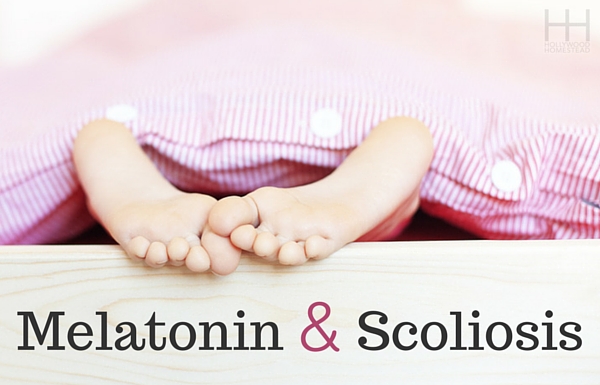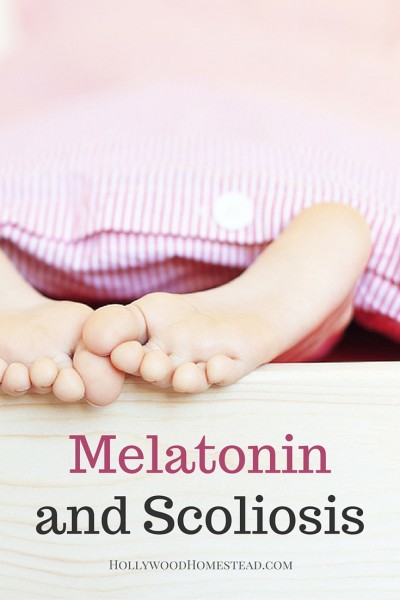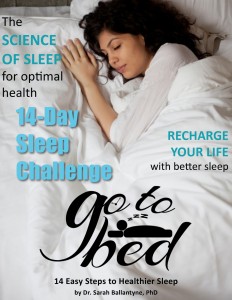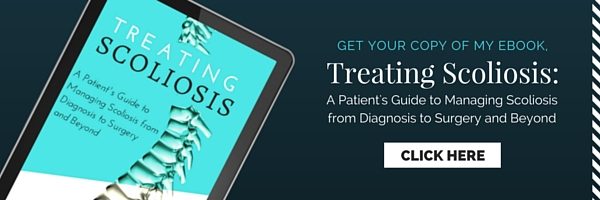
You probably already know that sleep is important for children’s development. Not only will they be tired, sluggish and cranky if they don’t get enough sleep, but their bodies literally won’t be able to keep up and growth – both physical and mental – can suffer. Lack of sleep will also affect immunity. But, when it comes to scoliosis, the importance of sleep doesn’t stop there. Research has shown that there is a link between the sleep hormone melatonin and scoliosis.
This is part of a series about treating scoliosis. Click the link to learn more about what scoliosis is, what causes it, and treatment options.
What is Melatonin?
I’ve talked about melatonin before in my posts about magnesium as an insomnia treatment and natural sleep aids. Melatonin is a hormone that our bodies make in response to darkness. Interestingly, melatonin is actually a stress hormone. The darkness stresses our bodies, and the bodies respond by making melatonin.
Melatonin is NOT a sleep inducer. It is a body-clock regulator. It tells your body when it is dark out (dark is stressful for the body). The body responds by going to sleep.
The body makes melatonin naturally out of the amino acid tryptophan. When you eat foods containing tryptophan, the tryptophan is first converted into serotonin and then the serotonin is converted into melatonin. If your diet is lacking in tryptophan, then you won’t be able to produce enough melatonin – which brings us back to nutrition and scoliosis. (Source)
The Link between Melatonin and Scoliosis
Melatonin is a hormone and, like all hormones, has many roles in our bodies. Research is now finding that melatonin may have an important role in bone formation. Low levels of melatonin have been linked to scoliosis.
The link between melatonin and scoliosis began with animal studies. Experiments were done in which the pineal gland was removed from animals. This resulted in the animals developing spinal deformities. Because the pineal gland is responsible for secreting melatonin, it was hypothesized that the lack of melatonin caused the spinal deformities.
Further experiments tested this hypothesis. Researchers induced scoliosis in animals by removing the pineal gland, but then gave the animals melatonin. When the animals were given melatonin, they did not develop spinal deformities. (Source)
The results aren’t as clear-cut with human studies. First off, bear in mind that for moral reasons you can’t induce scoliosis in human subjects. Instead, the studies which have been done look at patients who already have scoliosis and compare their melatonin levels with a control group.
Some studies found that patients with scoliosis had the same levels of melatonin as control groups. However, a few studies did find lower levels of melatonin in scoliosis patients. Interestingly, low melatonin levels have linked to scoliosis patients whose curves progressed rapidly. Scoliosis patients with normal melatonin levels had curves which didn’t progress or progressed slowly. (Source 1, 2, 3)
How Low Melatonin May Cause Scoliosis
Again, there is no proof that low melatonin causes scoliosis – there is just scientific evidence which supports a link between the two. Until further research is done, we can’t say conclusively that low melatonin causes scoliosis. However, that doesn’t mean you shouldn’t err on the side of caution and make sure your child with scoliosis is producing enough melatonin naturally.
Researchers believe that low melatonin may cause scoliosis in one or both of the following ways:
- Low melatonin causes calcium uptake dysfunction
- Low melatonin causes premature puberty
Melatonin and Calcium Uptake Dysfunction as a Cause of Scoliosis
Researchers believe that melatonin bonds with a calcium binding protein called calmodulin. In this way, it helps regulate calcium metabolism. Remember that calcium is found in the muscles too. It is what causes muscles to contract. If melatonin levels were low, it could alter calcium uptake from the muscles. The result would be too much calcium in the muscles and not enough in the bones. The imbalance between muscles and bones could result in deformities, i.e. scoliosis. (Source 1, 2)
Melatonin and Premature Puberty as a Cause of Scoliosis
Melatonin isn’t just responsible for regulating sleep cycles. It also regulates the onset of puberty. It is thought that low levels of melatonin could trigger premature puberty. (Source)
Note that scoliosis is more common in girls than boys, and that girls with scoliosis are more likely to have curvature progression than boys. Now consider the fact that girls enter puberty earlier than boys.
Neurologists have noted that the nervous system is often immature when girls enter puberty and is unable to balance the spine and control postural functions. So, if low melatonin is triggering early puberty, it isn’t going to help a developing child. The immature nervous system won’t be able to keep up with the rapid growth and there is a risk of scoliosis. The more mature the nervous system is at puberty, the lower the risk of scoliosis. (Source 1, 2, 3)
Another theory is that early puberty might cause scoliosis in girls because many nutrients are lost during menstruation. However, not every girl who has early puberty is going to get scoliosis, so there are likely multiple factors at play here including genetics, nutrition, and lifestyle. Since melatonin and adequate sleep are important for development and cognitive function though, it won’t hurt to pay attention to this area – regardless of whether it is a main underlying cause of your child’s scoliosis. (Source)
How to Increase Melatonin Levels (without pills)
If your child has scoliosis, then you should probably get a melatonin level test. If the results are low, then you will want to take steps to fix this problem ASAP – but that doesn’t mean you should go and get some melatonin pills. Melatonin pills, though “natural,” may actually be quite dangerous and ineffective.
Remember that melatonin is a hormone. We’ve got a lot of different hormones in our bodies, and they work in conjunction with each other and other natural chemicals like enzymes, minerals, etc. to regulate our body. You can’t just pop a pill to increase melatonin levels and expect everything to balance itself out. To put this into perspective, would you pop an estrogen pill and not expect any side effects? (Source)
It is best to increase your melatonin levels naturally. There are several ways you can do this:
- Get enough tryptophan: Tryptophan is found in high-protein foods like muscle meats, eggs, and fish
- Go to bed on a schedule: Going to bed on a schedule can help balance melatonin production levels.
- Minimize blue light: Did you know that the blue lights from computers, phones, and electronic devices can interfere with melatonin production? Stop using these at least 3 hours before bed. Or, if you must use your devices, then install a blue-light blocking app like F.lux or wear these special glasses.
- Turn the lights off: Light inhibits the production of melatonin, so don’t let your kids sleep with a nightlight on.
- Increase natural daylight exposure: You also need to make sure your child gets enough natural light during the day to balance out melatonin production.
(Source)
As you probably know, sleep is really important for a lot more than just scoliosis. For anyone who is having trouble sleeping, I recommend checking out the 14-Day Sleep Challenge. The guide tells you a lot of valuable information about the science of sleep, why you aren’t sleeping well, and gives you a step-by-step program for how to get to sleep. Check it out here.
Feeling overwhelmed about scoliosis? Download my eBook for a complete patient’s guide on what is scoliosis and how to treat it. You can buy it here.
Have you had your child’s melatonin levels checked? I’d love to hear your thoughts about this. Let us know in the comments.

Latest posts by Sylvie McCracken (see all)
- Treating H. Pylori (Part 3): What H. Pylori Does to the Body - August 8, 2022
- Treating H. Pylori (Part 2): How H. Pylori is Contracted - August 3, 2022
- Understanding Beef Labels: Organic, Pastured, Grass-Fed & Grain-Finished - July 25, 2022


I have scoliosis at 31 years of it is treatable
So by getting more melatonin will that reverse the curves at all or just hold them.
Very helpful. My 14 year old daughter had 2 curves. Her top curve is backwards. She gets a Boston brace on Thursday. She had a very hard time sleeping and was on a Billy blanket for the first 3 weeks of her life as well. I am very happy to hear about the melatonin link. She will be getting tested for it this week. I am so thankful for the information in these links. Thank you.
You’re so welcome, Sage! Best of luck to you and your daughter!
Hi sylvie
My daughter is 14.she has scoliosis and severe sleeping disorder. She has cerebral palsy .she is taking melatonin. Please advise me how to control her condition and sleep.
Very interesting article, my 15 year old daughter has scoliosis, 25 degree curve low in her spine, started her period at 11yrs old and spent her first 3 weeks from birth sleeping on a Billy blue blanket due to jaundice. I never connected these before but it makes you think that there may be a causal link.
My 12 year old daughter has a very similar stolesry…got her cycle at 11, 25 degree curve low in her spine, also and spent a couple of weeks on the light for jaundice.
Wow amazing read. My scoliosis is 110% double bend. I am now 69 years old and lived with scoliosis since age 13. I started my period and puberty at age 10. Throughout my younger years my sleep pattern was very bad I hardly sept at night. It all seems to fit into place. Thank you chris sargent
You’re welcome Chris!
Very fascinating. My 4 yo has had a hard time with sleep pretty much her entire life thus far. She struggles with multiple food allergies, histamine issues and gut dysbiosis so I always figured it was related. Last time labs were done, her melatonin levels were extremely low. It is a struggle to raise them with all of her diet restrictions. I am a Pilates instructor and work with many with scoliosis and it can be a hard road for sure. Love your posts Sylvie! And we recently moved to Dubai so hello neighbor!
Hi Becky, Glad you like the posts. We just left Dubai recently back to the States! 🙂
You’re welcome Karen – glad it was helpful
Sylvie
Wow! This is fascinating. Our 11-yr old daughter has struggled with sleep issues since she was born. Before I knew about melatonin, I used to give her Benadryll (I hate to admit this but I was desperate) since it was the only thing that would get her to sleep! A neurologist recommended us supplementing with melatonin at night and it saved our lives from 5 years of sleep deprivation. While I know it’s dangerous to supplement with melatonin, I have tried every supplement, essential oil, magnesium creams/oils, massage, relaxation techniques on the planet and nothing else has worked.
That being said, she has scoliosis (20% curvature in her spine) that we are closely monitoring.
I have never even heard nor considered the link between melatonin deficiency and scoliosis.
Thanks for sharing this information. 🙂
You’re welcome Karen – glad it was helpful
Sylvie